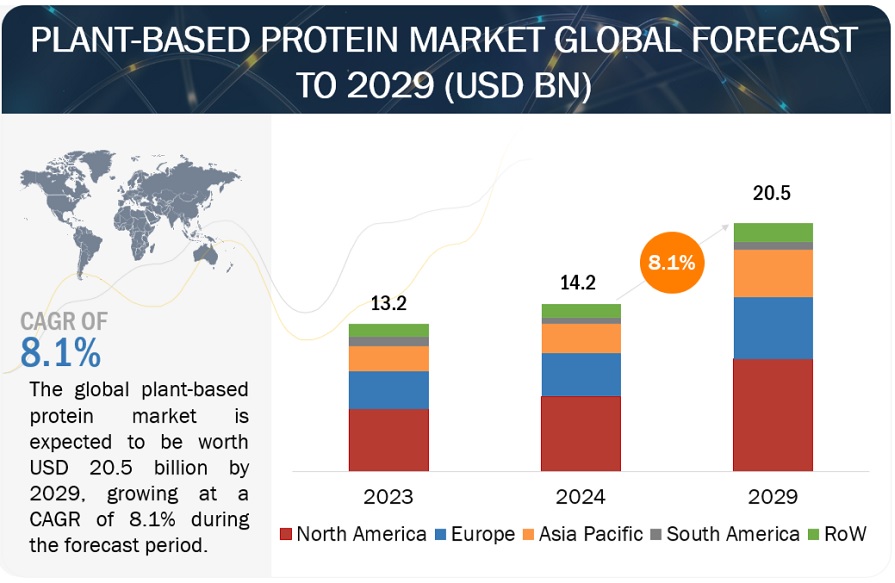The global plant-based protein market is estimated at USD 13.3 billion in 2023 and is projected to reach USD 19.2 billion by 2028, at a CAGR of 7.7% from 2023 to 2028. Plant-based proteins have surged in popularity thanks to their diverse range of nutritional benefits, attracting individuals in search of a healthier and more sustainable protein source. These advantages encompass reduced saturated fat content, enhanced cardiovascular well-being, and improved weight management, which have all contributed to the increasing consumption of plant-based proteins. Many plant-based protein sources, including soy, peas, lentils, and beans, deliver ample protein without the accompanying cholesterol and excess calories often found in animal-based protein.

Download PDF Brochure: https://www.marketsandmarkets.com/pdfdownloadNew.asp?id=116279237
The growing prevalence of dietary restrictions and heightened awareness of the environmental impact of animal agriculture have prompted the exploration of plant-based protein alternatives. These alternatives provide solutions for individuals with dietary constraints due to ethical, health, or environmental concerns. Products such as tofu, tempeh, and seitan have gained popularity as they offer a nourishing and versatile substitute for meat and animal-derived protein sources. Moreover, plant-based proteins are increasingly enriched with essential nutrients like vitamins, minerals, and antioxidants, supporting overall health and well-being. Consumers are now seeking plant-based protein options that offer specific functional benefits, such as protein powders fortified with additional vitamins and amino acids to aid muscle growth and recovery.
In response to the escalating demand for plant-based protein choices, the market has diversified its offerings to accommodate various dietary requirements. This development is particularly pertinent for vegetarians, vegans, and those aiming to reduce their meat consumption. The plant-based protein market now encompasses a wide array of options, including plant-based burgers, sausages, protein-packed snacks, and plant-based dairy alternatives. Culinary innovation and flavor exploration have also taken center stage in this market, providing consumers with a delectable and savory range of plant-based protein choices. As the demand for plant-based proteins continues to soar, the market is evolving to offer an ever-expanding selection of environmentally sustainable and nutritious plant-based protein sources, facilitating the adoption of a protein-rich, plant-centric diet.
The liquid sub-segment in the form segment is estimated to grow at 9.0% during the forecasted period.
The traditional method for obtaining plant protein ingredients from legumes involves a liquid-based process that requires a significant amount of water and energy due to hydration. Legumes high in starch, like peas and beans, are separated by dissolving the protein and suspending the starch granules in water, while oil-rich sources, like soy and lupine, undergo solvent extraction to isolate the oil content. These ingredients are used in animal feed and can be further processed to obtain protein isolates, primarily finding applications in nutritional supplements and beverages, driven by the increasing global demand for plant-based protein as more people transition from conventional dairy and whey-based options. The convenience of liquid plant-based proteins, requiring minimal preparation compared to powdered alternatives, resonates with busy individuals looking for quick and nutritious meal options. Additionally, the versatility of liquid plant-based proteins in culinary applications, from enhancing smoothies and shakes to enriching soups, sauces, and dressings, further contributes to their popularity in the kitchen.
Make an Inquiry: https://www.marketsandmarkets.com/Enquiry_Before_BuyingNew.asp?id=116279237
Soy source is estimated to dominate the by source segment in the plant-based protein market.
Soy protein is a highly popular plant-based protein source, with soybeans being processed into three main types: soy isolates, soy concentrates, and textured soy protein, all of which are rich in essential amino acids crucial for human nutrition. Additionally, soy protein offers various proven health benefits, such as reducing the risk of heart and cardiovascular diseases. The Food and Drug Administration (FDA) has indicated that consuming 25 grams of soy protein per day, as part of a low-saturated fat and low-cholesterol diet, can help lower the risk of heart disease.
As the demand for soy-based protein continues to rise, there has been a significant increase in soybean exports. In 2020, the value of US soybean exports to the global market reached a historic high of $25.7 billion, representing a 40% increase in value and a 23% increase in volume compared to the previous year. This surge is attributed to the growing popularity of soybeans and soy-based protein.
Given the global demand for soy proteins, companies in the plant-based protein industry are actively working to strengthen their market presence through product development and the launch of new soy protein-based products. An example of this is Benson Hill Inc (US), which introduced TruVail, a range of soy protein ingredients suitable for use in bakery products, meat alternatives, and snacks, aiming to tap into the expanding market for alternative plant-based proteins.
The Asia Pacific is estimated to grow at the fastest CAGR in the plant-based protein market.
The demand for fortified nutritional food and beverage products is on the rise in the Asia Pacific region due to busy lifestyles and increased disposable incomes. The use of dairy alternatives is expected to grow rapidly in response to consumer preferences. With greater economic power among consumers in the region, there is an increased consumption of affordable and abundant products like soymilk. Food manufacturers are introducing various forms of soymilk to meet the growing demand for healthy beverages, including pasteurized soymilk, as dairy alternatives, and unique flavored soy drinks.
This report focuses on major countries in the region, including Japan, Australia, China, and India. Key market players in this area include Sanitarium Health & Wellbeing Company and Freedom Foods Group Ltd. in Australia, Vitasoy International Holdings Limited in Hong Kong, and Purcharest in Australia. The dairy alternatives industry in the Asia Pacific region is experiencing significant growth, driven by changes in consumer lifestyles. The market is evolving rapidly due to urbanization, dietary diversification, and increased foreign direct investment in the food sector. Additionally, rising incomes, greater purchasing power, a growing middle-class population, heightened consumer awareness of health and fitness, and increased demand for nutritional and healthy products are creating promising opportunities for growth and diversification in the region’s food sector.
Therefore, major players in the region, such as ADM (US), Cargill, Incorporated (US), International Flavors & Fragrances Inc. (US), Ingredion (US), Roquette Frères (France), are trying their best to tap the region’s potential by expanding and diversifying plant-based protein portfolios to meet the consumer’s demand.
Get 10% Free Customization on this Report: https://www.marketsandmarkets.com/requestCustomizationNew.asp?id=116279237
About MarketsandMarkets™
MarketsandMarketsTM has been recognized as one of America’s best management consulting firms by Forbes, as per their recent report.
MarketsandMarkets™ is a blue ocean alternative in growth consulting and program management, leveraging a man-machine offering to drive supernormal growth for progressive organizations in the B2B space. We have the widest lens on emerging technologies, making us proficient in co-creating supernormal growth for clients.
Earlier this year, we made a formal transformation into one of America’s best management consulting firms as per a survey conducted by Forbes.
The B2B economy is witnessing the emergence of $25 trillion of new revenue streams that are substituting existing revenue streams in this decade alone. We work with clients on growth programs, helping them monetize this $25 trillion opportunity through our service lines – TAM Expansion, Go-to-Market (GTM) Strategy to Execution, Market Share Gain, Account Enablement, and Thought Leadership Marketing.
Built on the ‘GIVE Growth’ principle, we work with several Forbes Global 2000 B2B companies – helping them stay relevant in a disruptive ecosystem. Our insights and strategies are molded by our industry experts, cutting-edge AI-powered Market Intelligence Cloud, and years of research. The KnowledgeStore™ (our Market Intelligence Cloud) integrates our research, facilitates an analysis of interconnections through a set of applications, helping clients look at the entire ecosystem and understand the revenue shifts happening in their industry.
Media Contact
Company Name: MarketsandMarkets™ Research Private Ltd.
Contact Person: Mr. Aashish Mehra
Email: Send Email
Phone: 18886006441
Address:630 Dundee Road Suite 430
City: Northbrook
State: IL 60062
Country: United States
Website: https://www.marketsandmarkets.com/Market-Reports/plant-based-protein-market-14715651.html

